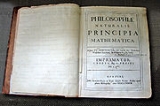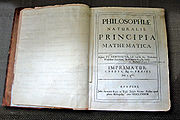
Imprimatur
Encyclopedia
An imprimatur is, in the proper sense, a declaration authorizing publication of a book. The term is also applied loosely to any mark of approval or endorsement.
, this permission must be preceded by a declaration (known as a nihil obstat
) by a person charged with the duties of a censor that the work contains nothing damaging to faith or morals, the bishop's authorization of publication is implicitly a public declaration that nothing offensive to Catholic teaching on faith and morals has been found in it. The imprimatur is not an endorsement by the bishop of the contents of a book, not even of the religious opinions expressed in it, being merely a declaration about what is not in the book. In the published work, the imprimatur is sometimes accompanied by a declaration of the following tenor:
The person empowered to issue the imprimatur is the local ordinary of the author or of the place of publication. If he refuses to grant an imprimatur for a work that has received a favourable nihil obstat from the censor, he must inform the author of his reasons for doing so. This enables the author, if he wishes, to make changes so as to overcome the ordinary's difficulty.
If further examination shows that a work is not free of doctrinal or moral error, the imprimatur granted for its publication can be withdrawn. This happened three times in the 1980s, when the Holy See
judged that complaints made to it about religion textbooks for schools were well founded and ordered the bishop to revoke his approval.
The imprimatur granted for a publication is not valid for later editions of the same work or for translations into another language. For these, new imprimaturs are required.
The permission of the local ordinary is required for the publication of prayer books, catechism
s and other catechetical texts, and school textbooks on Scripture, theology, canon law, church history, or religious or moral subjects. It is recommended, but without obligation, that books on the last-mentioned subjects not intended to be used as school textbooks and all books dealing especially with religious or moral subjects be submitted to the local ordinary for judgement.
In 2010, Bishop Kevin C. Rhoades
was the first bishop to grant an imprimatur to an iPhone application.
 English laws of 1586, 1637 and 1662 required an official licence for printing books. The 1662 act required that, according to their subject, books needed to receive the authorization, known as the imprimatur, of the Lord Chancellor, the Earl Marshall, a principal Secretary of State, the Archbishop of Canterbury or the Bishop of London. This law finally expired in 1695.
English laws of 1586, 1637 and 1662 required an official licence for printing books. The 1662 act required that, according to their subject, books needed to receive the authorization, known as the imprimatur, of the Lord Chancellor, the Earl Marshall, a principal Secretary of State, the Archbishop of Canterbury or the Bishop of London. This law finally expired in 1695.
As a metaphor, the word "imprimatur" is used loosely of any form of approval or endorsement, especially by an official body or a person of importance, as in the newspaper headline, "Protection of sources now has courts' imprimatur", but also much more vaguely as in "Children, the final imprimatur to family life, are being borrowed, adopted, created by artificial insemination."
is a hypothetical system of internet censorship
.
Imprimatur is also the name of a 2002 thriller novel by Rita Monaldi
and Francesco Sorti
, with the castrato
singer Atto Melani
as a central character.
In painting
, the distinct term "imprimatura
" is used of an underlying coat of paint.
Catholic Church
In the Catholic Church an imprimatur is an official declaration by a Church authority that a book or other printed work may be published. Since, according to canon lawCanon law
Canon law is the body of laws & regulations made or adopted by ecclesiastical authority, for the government of the Christian organization and its members. It is the internal ecclesiastical law governing the Catholic Church , the Eastern and Oriental Orthodox churches, and the Anglican Communion of...
, this permission must be preceded by a declaration (known as a nihil obstat
Nihil obstat
Nihil obstat is a declaration of no objection to an initiative or an appointment....
) by a person charged with the duties of a censor that the work contains nothing damaging to faith or morals, the bishop's authorization of publication is implicitly a public declaration that nothing offensive to Catholic teaching on faith and morals has been found in it. The imprimatur is not an endorsement by the bishop of the contents of a book, not even of the religious opinions expressed in it, being merely a declaration about what is not in the book. In the published work, the imprimatur is sometimes accompanied by a declaration of the following tenor:
The nihil obstat and imprimatur are declarations that a book or pamphlet is free of doctrinal or moral error. No implication is contained therein that those who have granted the nihil obstat or imprimatur agree with the contents, opinions or statements expressed.
The person empowered to issue the imprimatur is the local ordinary of the author or of the place of publication. If he refuses to grant an imprimatur for a work that has received a favourable nihil obstat from the censor, he must inform the author of his reasons for doing so. This enables the author, if he wishes, to make changes so as to overcome the ordinary's difficulty.
If further examination shows that a work is not free of doctrinal or moral error, the imprimatur granted for its publication can be withdrawn. This happened three times in the 1980s, when the Holy See
Holy See
The Holy See is the episcopal jurisdiction of the Catholic Church in Rome, in which its Bishop is commonly known as the Pope. It is the preeminent episcopal see of the Catholic Church, forming the central government of the Church. As such, diplomatically, and in other spheres the Holy See acts and...
judged that complaints made to it about religion textbooks for schools were well founded and ordered the bishop to revoke his approval.
The imprimatur granted for a publication is not valid for later editions of the same work or for translations into another language. For these, new imprimaturs are required.
The permission of the local ordinary is required for the publication of prayer books, catechism
Catechism
A catechism , i.e. to indoctrinate) is a summary or exposition of doctrine, traditionally used in Christian religious teaching from New Testament times to the present...
s and other catechetical texts, and school textbooks on Scripture, theology, canon law, church history, or religious or moral subjects. It is recommended, but without obligation, that books on the last-mentioned subjects not intended to be used as school textbooks and all books dealing especially with religious or moral subjects be submitted to the local ordinary for judgement.
In 2010, Bishop Kevin C. Rhoades
Kevin C. Rhoades
Kevin Carl Rhoades is an American prelate of the Roman Catholic Church. He is the ninth Bishop of Fort Wayne-South Bend, having served as Bishop of Harrisburg from 2004 to 2009.-Early life:...
was the first bishop to grant an imprimatur to an iPhone application.
English law

Other senses
In commercial printing, the term is used, in line with the meaning of the Latin word, of final approval by a customer or his agent, perhaps after review of a test printing, for carrying out the printing job.As a metaphor, the word "imprimatur" is used loosely of any form of approval or endorsement, especially by an official body or a person of importance, as in the newspaper headline, "Protection of sources now has courts' imprimatur", but also much more vaguely as in "Children, the final imprimatur to family life, are being borrowed, adopted, created by artificial insemination."
Similar terms
Digital imprimaturDigital imprimatur
The Digital Imprimatur is an article written in 2003 by John Walker, and hence "digital imprimatur" is a term widely associated with him. In the Roman Catholic Church, an imprimatur is a censor's official declaration that a work is free from doctrinal or moral error, but Walker uses the term...
is a hypothetical system of internet censorship
Internet censorship
Internet censorship is the control or suppression of the publishing of, or access to information on the Internet. It may be carried out by governments or by private organizations either at the behest of government or on their own initiative...
.
Imprimatur is also the name of a 2002 thriller novel by Rita Monaldi
Rita Monaldi
Rita Monaldi is an Italian journalist and writer who, in collaboration with her husband, Francesco Sorti, wrote a series of literary-historical books called Imprimatur, Secretum and Veritas, with Atto Melani as a central character. She majored in classical philology and specialized in the history...
and Francesco Sorti
Francesco Sorti
Francesco Sorti is an Italian journalist who, in collaboration with his wife Rita Monaldi, wrote a series of literary-historical books called Imprimatur, Secretum and Veritas, with Atto Melani as a central character. They both live in Vienna....
, with the castrato
Castrato
A castrato is a man with a singing voice equivalent to that of a soprano, mezzo-soprano, or contralto voice produced either by castration of the singer before puberty or one who, because of an endocrinological condition, never reaches sexual maturity.Castration before puberty prevents a boy's...
singer Atto Melani
Atto Melani
Atto Melani was a famous Italian castrato opera singer, also employed as a diplomat and a spy.-Life:...
as a central character.
In painting
Painting
Painting is the practice of applying paint, pigment, color or other medium to a surface . The application of the medium is commonly applied to the base with a brush but other objects can be used. In art, the term painting describes both the act and the result of the action. However, painting is...
, the distinct term "imprimatura
Imprimatura
Imprimatura is a term used in painting, meaning an initial stain of color painted on a ground. It provides a painter with a transparent, toned ground, which will allow light falling onto the painting to reflect through the paint layers. The term itself stems from the Italian and literally means...
" is used of an underlying coat of paint.

